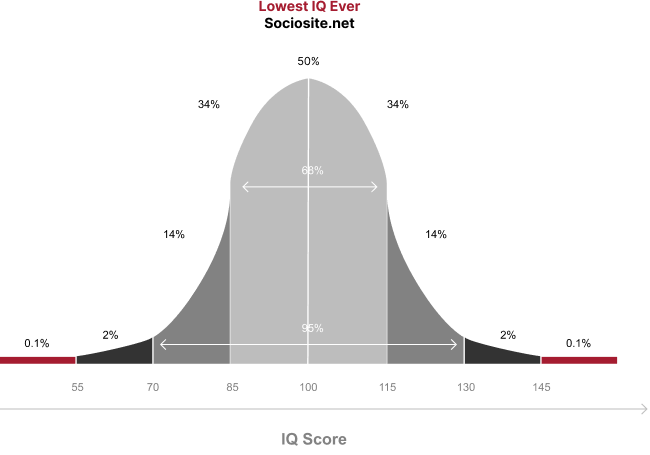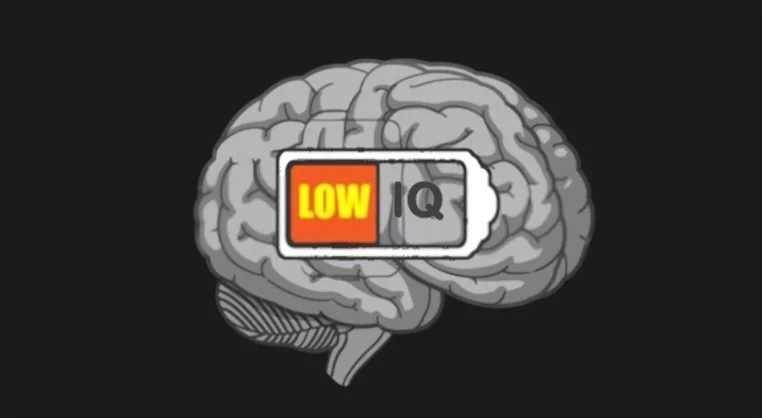Intelligence Quotient
About IQ & Contributors History
IQ Test Classic | Kids | High Range
What is the lowest IQ ever? Facts about people who possess lowest IQ
I. The Definition of the Lowest IQ Ever
The lowest IQ score ever recorded is a topic that sparks a lot of curiosity and speculation. People wonder what it means to have an extremely low IQ score, how it impacts one's life, and whether it's possible for someone to have a score of zero. In this article, we will explore the definition of the lowest IQ ever recorded and shed light on some common misconceptions about IQ scores.

First, it's important to understand what IQ means. IQ stands for Intelligence Quotient and is a measure of a person's cognitive abilities. IQ tests are designed to assess a range of skills such as problem-solving, spatial awareness, memory, and logical reasoning. The average IQ score is set at 100, and scores above or below this number are used to categorize people into different levels of intellectual ability.
The lowest IQ score ever recorded is in the category of "profound mental retardation." This means that a person's cognitive abilities are severely limited and that they require constant support to perform daily tasks. To put this into perspective, people with profound mental retardation would struggle with basic tasks such as dressing themselves, using the bathroom, and communicating effectively.
It's important to note that IQ scores are not a perfect measure of intelligence. While they can provide valuable insights into a person's cognitive abilities, they don't account for other factors that can impact a person's intellectual development such as cultural background, education, and life experiences. Additionally, IQ tests may not be suitable for people with certain disabilities or language barriers.
II. Understanding Profound Mental Retardation: The Lowest IQ Score ever Category
Promoting inclusivity and empathy for those who experience profound mental retardation requires an understanding of the lowest IQ score category. We can better comprehend the difficulties and restrictions that people with profound mental retardation encounter in their daily lives by understanding the causes and symptoms of this condition. To assist them in navigating the world and realizing their full potential, people with low IQ scores need to be treated with patience, understanding, and support. Let's work to make society more compassionate and inclusive for all.
1. The Causes and Symptoms of Profound Mental Retardation
Profound mental retardation is a condition characterized by severe cognitive impairment that significantly affects an individual's daily life. It is the lowest IQ score category, with scores ranging from 1-24. The causes of profound mental retardation can vary and are often complex. In this article, we will explore the common causes and symptoms of profound mental retardation.
1.1 Causes of Profound Mental Retardation
-
Genetic disorders: Several genetic disorders can cause profound mental retardation. Examples include Down syndrome, fragile X syndrome, and Prader-Willi syndrome.
-
Brain damage: Traumatic brain injury or damage to the brain during childbirth or pregnancy can result in profound mental retardation.
-
Malnutrition: Severe malnutrition during pregnancy or in early childhood can lead to profound mental retardation.
-
Infections: Certain infections during pregnancy, such as rubella or cytomegalovirus, can cause profound mental retardation.
1.2 Symptoms of Profound Mental Retardation
-
Significant developmental delays: Children with profound mental retardation experience significant developmental delays in areas such as language, motor skills, and social skills.
-
Poor communication skills: Individuals with profound mental retardation have difficulty communicating effectively and may use non-verbal cues or gestures instead of words.
-
Limited problem-solving skills: Individuals with profound mental retardation may have difficulty solving problems or understanding complex concepts.
-
Dependence on others for daily activities: People with profound mental retardation require assistance with daily activities such as dressing, feeding, and using the bathroom.
It's important to note that the severity of symptoms can vary from person to person, and not all individuals with profound mental retardation will display the same symptoms. Additionally, early intervention and appropriate support can help individuals with profound mental retardation improve their quality of life and reach their full potential.

2. The Impacts of Profound Mental Retardation on Daily Life
Profound mental retardation can have a significant impact on an individual's daily life. People with this condition often require extensive support and assistance with daily activities. In this article, we will explore the various impacts of profound mental retardation on daily life.
-
Education: Children with profound mental retardation may require specialized education programs to help them learn and develop basic skills. They may struggle with academic subjects and require alternative methods of learning.
-
Employment: Adults with profound mental retardation may have limited employment opportunities due to their cognitive limitations. They may require extensive support and accommodations in the workplace to perform basic tasks.
-
Socialization: Individuals with profound mental retardation may struggle with social interactions and have difficulty forming relationships. They may require assistance with developing social skills and engaging in community activities.
-
Daily living: People with profound mental retardation may require assistance with basic daily living activities such as eating, dressing, and bathing. They may require specialized equipment or modifications to their living environment to ensure their safety and comfort.
-
Healthcare: People with profound mental retardation may have additional healthcare needs, such as assistance with medications and medical procedures. They may require specialized care providers to address their unique medical needs.
-
Emotional well-being: Individuals with profound mental retardation may experience emotional challenges such as anxiety, depression, and frustration due to their cognitive limitations and social challenges. They may require support and therapy to address these challenges.
To sum up, profound mental retardation can significantly affect day-to-day life. In order for people with profound mental retardation to lead fulfilling lives, it is crucial to offer them support and accommodations. A more compassionate and understanding society can be built by promoting inclusivity and acceptance of people with disabilities.
III. How Lowest IQ Scores Affect People's Lives: Real-Life Examples
Low IQ levels can significantly affect a person's life, making it difficult for them to carry out simple tasks and understand the complexities of the world around them. Examples of people with low IQs in real life show how crucial it is to support and comprehend those who might struggle with cognitive limitations. Regardless of IQ level, we can ensure that everyone has the chance to realize their full potential by promoting an inclusive and compassionate society.

1. Challenges Faced by People with Low IQ Scores in Education and Employment
People with low IQ scores may face significant challenges in education and employment. In this article, we will explore the specific challenges faced by individuals with low IQ scores in these areas.
1.1 Education
-
Difficulty in learning: Individuals with low IQ scores may struggle to learn new concepts and retain information, making it challenging for them to keep up with their peers.
-
Limited educational opportunities: People with low IQ scores may have limited access to educational programs that cater to their needs and abilities.
-
Social exclusion: Students with low IQ scores may face social exclusion from their peers, which can impact their overall experience of school and their motivation to learn.
-
Stigma and discrimination: People with low IQ scores may face stigma and discrimination from teachers and other educational professionals, which can negatively impact their educational experience.
1.2 Employment
-
Limited job opportunities: People with low IQ scores may have limited employment opportunities due to their cognitive limitations.
-
Difficulty in job retention: Individuals with low IQ scores may struggle to retain employment due to challenges in following instructions, learning new tasks, and adhering to workplace norms and policies.
-
Discrimination in hiring: Employers may discriminate against individuals with low IQ scores due to stereotypes and misconceptions about their abilities and potential productivity.
-
Social exclusion: People with low IQ scores may experience social exclusion and isolation in the workplace, which can impact their job satisfaction and overall well-being.
People with low IQ scores face unique challenges in education and employment. It's important for educators and employers to provide support and accommodations to ensure individuals with low IQ scores have equal access to education and employment opportunities. Promoting inclusivity and acceptance in society can also help to reduce stigma and discrimination towards people with low IQ scores.
2. The Social and Emotional Impact of Low IQ Scores on Personal Relationships
Low IQ scores can have a significant social and emotional impact on personal relationships. In this article, we will explore the specific challenges faced by individuals with low IQ scores in forming and maintaining personal relationships.
-
Difficulty in forming relationships: People with low IQ scores may struggle to initiate and maintain personal relationships due to communication and social skills deficits.
-
Limited social networks: Individuals with low IQ scores may have limited social networks due to difficulty in making friends and sustaining relationships.
-
Social exclusion: People with low IQ scores may face social exclusion and isolation from their peers, leading to feelings of loneliness and depression.
-
Misunderstandings and communication barriers: Individuals with low IQ scores may experience misunderstandings and communication barriers in personal relationships, leading to frustration and conflict.
-
Vulnerability to exploitation: People with low IQ scores may be vulnerable to exploitation and abuse in personal relationships, particularly in situations where they may struggle to understand the intentions of others.
In addition to the above challenges, low IQ scores can also impact the emotional well-being of individuals. People with low IQ scores may experience low self-esteem, anxiety, and depression due to their struggles in personal relationships. They may also internalize negative stereotypes and beliefs about their abilities, further impacting their self-esteem and confidence.
3. Coping Strategies and Support Systems for People with Low IQ Scores
Living with low IQ scores can present many challenges in various aspects of life, including education, employment, and personal relationships. However, there are coping strategies and support systems that can help individuals with low IQ scores navigate these challenges and achieve a fulfilling life.
-
Seeking educational support: Individuals with low IQ scores can benefit from educational support such as individualized education plans, tutoring, and assistive technology. This can help them better understand academic material and improve their performance in school.
-
Utilizing employment support: There are programs available to support individuals with low IQ scores in gaining and maintaining employment. This can include job coaching, vocational training, and reasonable accommodations in the workplace.
-
Developing communication and social skills: People with low IQ scores can benefit from training and support to improve their communication and social skills. This can help them form and maintain relationships and navigate social situations more effectively.
-
Engaging in therapy: Therapy can be beneficial for individuals with low IQ scores, particularly in addressing emotional challenges such as depression and anxiety. Therapists can provide strategies to manage emotions and build self-esteem.
-
Building a supportive network: Building a supportive network of family, friends, and professionals can help individuals with low IQ scores feel more connected and empowered. This can provide emotional support, guidance, and resources to navigate challenges.
Although having a low IQ can be difficult, there are coping mechanisms and support networks that can be used to help people get through these difficulties and lead satisfying lives. To overcome challenges and realize one's full potential, it's critical to look for these resources and create a strong network of allies.
IV. Can Someone Have Zero IQ? Debunking Myths About the Lowest IQ ever Score
There is no such thing as a person with a zero IQ score. Although it is theoretically possible to have an IQ score close to zero, such a person would most likely be severely mentally disabled and unable to take the test in the first place. Understanding the limitations of IQ tests and the various types of intelligence that go beyond what they can measure is crucial. People with low IQs should not be viewed solely in terms of their test results, but rather with empathy and understanding, taking into account both their individual strengths and challenges.
1. Can a person have an IQ of 0?
The concept of a person having a zero IQ score is actually a myth. IQ tests are designed to measure intelligence on a scale, with an average score falling somewhere between 90 and 110. However, even people with severe intellectual disabilities or profound mental retardation, who may score very low on IQ tests, will not have a zero score.

It's important to note that IQ tests are not designed to accurately measure the intelligence of individuals with severe intellectual disabilities, as they are not able to comprehend or respond to many of the questions on the test. In such cases, other assessments are used to evaluate the individual's cognitive abilities and support needs.
Furthermore, intelligence is not a fixed or static trait, but a complex and multifaceted concept that encompasses a wide range of abilities and skills. It's important to recognize that people can demonstrate intelligence in different ways and that a low IQ score on a test does not necessarily reflect a person's overall intelligence or potential.
While the idea of a person having a zero IQ score is a myth, it's important to recognize that IQ tests have limitations and should be used carefully and appropriately to evaluate intelligence. It's also important to remember that intelligence is a complex and varied concept and that everyone has unique strengths and abilities, regardless of their IQ score.
2. Debunking Myths About the Lowest IQ Score
There are many myths surrounding the concept of the lowest IQ score, including the idea that someone can have a score of zero, or that people with low IQ scores are not intelligent or capable of learning. However, these myths are largely inaccurate and can contribute to harmful stereotypes and discrimination against individuals with low IQ scores.
First, it's important to understand that IQ scores are just one measure of intelligence and cognitive ability. While low IQ scores may indicate challenges in certain areas, they do not reflect a person's overall worth or potential.
Additionally, there is no such thing as a zero IQ score. IQ tests are designed to measure intelligence on a scale, with an average score falling somewhere between 90 and 110. While individuals with severe intellectual disabilities or profound mental retardation may score very low on IQ tests, they will not receive a score of zero.
Furthermore, it's a myth that people with low IQ scores cannot learn or be successful. With the right support, accommodations, and educational opportunities, individuals with low IQ scores can develop skills and achieve their goals.
It's also important to recognize that intelligence is a complex and multifaceted concept that encompasses many different abilities and skills. People with low IQ scores may have strengths and talents in areas such as creativity, emotional intelligence, or practical skills, which are not measured by IQ tests.
V. The Importance of Empathy and Understanding for People with the Lowest IQ ever recorded
With those who have the lowest IQ scores, communication requires empathy and understanding. It's crucial to keep in mind that those with lower IQs are still valuable and deserve respect and kindness just as much as those with higher IQs. They might simply have different worldviews and particular strengths and weaknesses.
The topic of empathy and understanding for people with the lowest IQ scores is a crucial one in today's society. Those with low IQ scores are often misunderstood and face many challenges in their daily lives, including education, employment, and personal relationships. It is important to recognize that intelligence comes in many different forms and to understand and empathize with those who may struggle with intellectual disabilities.
Empathy and understanding can go a long way in supporting people with low IQ scores. By recognizing their unique abilities and limitations, we can work together to create a more inclusive and supportive environment. This includes providing access to educational and employment opportunities that are tailored to their needs, as well as recognizing and accommodating their communication and social skills.
It is also important to recognize the impact that stereotypes and stigmas can have on individuals with low IQ scores. By promoting empathy and understanding, we can work to combat these harmful perceptions and promote a more positive and inclusive society.
In addition, it is crucial to provide resources and support systems for individuals with low IQ scores, as they may face challenges in their daily lives that require assistance. This can include access to counseling services, specialized education programs, and vocational training opportunities.
VI. Facts about people who have lowest IQ ever recorded
Here are some facts about people who have the lowest IQ scores ever recorded:
-
The lowest possible score on most IQ tests is 0, but it's extremely rare for anyone to score that low. Most people with the lowest IQ scores fall into the category of profound mental retardation, which is defined as an IQ score of 25 or below.
-
People with the lowest IQ scores often have difficulty with basic life skills such as communication, self-care, and mobility. They may require extensive support and assistance in their daily lives.
-
The causes of low IQ scores can vary widely and may include genetic factors, brain damage, malnutrition, or exposure to toxins.
-
People with low IQ scores may face significant challenges in education, employment, and social situations. They may require specialized services and accommodations in order to succeed in these areas.
-
It's important to remember that people with low IQ scores are not defined by their test scores. They are individuals with unique personalities, strengths, and challenges, and should be treated with the same dignity and respect as anyone else.
-
People with the lowest IQ scores may struggle with basic life skills, such as personal hygiene, managing money, and using public transportation.
-
Individuals with low IQ scores may also have difficulty with social skills, such as understanding social cues and building relationships with others.
-
While IQ scores are important in certain contexts, such as education and employment, they do not define a person's worth or potential.
